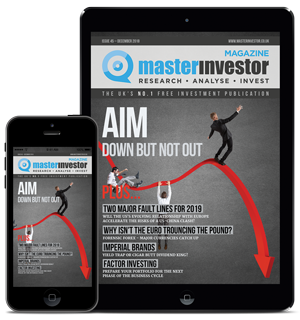Alternative times call for alternative solutionsSPONSORED CONTENT

With so much uncertainty shrouding 2019 already, now might be a good time to diversify your portfolio and seek alternative returns away from mainstream markets, say James de Bunsen and Peter Webster, Co-Fund Managers of Henderson Alternative Strategies Trust.

Never miss an issue of Master Investor Magazine – sign-up now for free! |
It’s been a fantastic decade for equity markets, but now there is a growing consensus among money managers and economists that we are entering the latter stages of the business cycle. That could mean recession, volatility and ultimately a downturn for equity markets is likely in the next 18-24 months.
What’s more, investors are confronted by some unusual geopolitical and socioeconomic factors that are shaping markets and business prosperity. For UK investors, Brexit is at the top of the list, while Trump’s tenure as President of the USA has indelibly shaped global economics with (at least) two years to go. Digital disruptors and Europe’s political turbulence are also forces at play as we enter 2019.
The complexity and inherent uncertainty of these factors makes it difficult to say with any real conviction how markets are likely to develop over the next 18 months or so. At Henderson Alternative Strategies Trust (LON:HAST), we have been gradually reducing the portfolio’s riskier positions in anticipation of a downturn and October’s sell-off was a comforting nod to the team’s efforts.
Encouraging signs
October may have been a sign of things to come, with increased volatility typical of the latter stages of the business cycle. The FTSE World Index, which HAST aims to outperform over the long-term, returned -5.5% during the month. The Trust returned -2.2%, which means it outperformed the benchmark by 3.3% (Source: Bloomberg) during a tough month for global investment markets. The Trust’s NAV was also less sensitive to the late January/early February sell-off in global equity markets.
This is encouraging in the sense that we have built the portfolio to be less correlated with mainstream equity and bond markets over recent years and we have proactively reduced the portfolio’s exposure to riskier assets (risk-off). It gives us some confidence that we are moving in the right direction and – if tough times are indeed ahead – we can weather the storm and keep our shareholders happy.
Reorienting the portfolio to a ‘risk-off’ position has been a gradual process, but now we are close to where we want to be. We have divided the portfolio into six distinct categories:hedge funds (23.7% as at 21stNovember), private equity (29.6%), listed equity (15.4%), property (12.2%), commodities (4.0%) and credit (11.1%). This helps us navigate away from the mainstream markets and aim to deliver uncorrelated returns for our shareholders, which we believe will be resilient during challenging periods.
Hedge funds
We took the opportunity during October’s sell-off to top up a few of our hedge fund positions with the sector taking a heavy beating during the month. Our largest hedge fund holding is in Blackrock European Hedge Fund. The fund takes both long and short positions to invest in the public equity markets of Europe. It invests in stocks of companies operating across diversified sectors and invests across all market capitalisations, with the primary aim of maximising total returns.
We like the fund’s flexibility and the management team is very skilled, hence our confidence in the fund’s ability to deliver attractive returns. After a stellar 2017, European equities are once more out of favour with global investors, but we think the fundamentals for growth in Europe remain intact. There are some political concerns across the region, but value has returned to the continent and we believe it’s a strong diversifier to the US’ long-running bull market.
Private equity
Private equity has traditionally formed a key part of the Trust’s strategy and we have been pleased with the segment’s performance this year. One pick from the private equity sleeve of the portfolio is Mantra Investment Partners’ Mantra Special Opportunities Fund, also one of the Trust’s largest holdings. The fund invests in a broad range of private equity businesses and we like it because it buys these businesses at significant discounts to net asset value. Mantra is able to do this because it acts as a liquidity provider for investors in private investments that are seeking an exit of what is usually a small holding for them. Mantra is small in size and is nimble as a result, picking up small positions at large discounts and then seeking an exit. It has executed the strategy very successfully to date.
Listed equity
Burford Capital was one of two new positions added during October and it is one we are very keen on. We have undertaken significant work looking into litigation finance as an emerging asset class.The market sell-off in early October provided a good entry point for us to open a position inBurford, which suffered as did many small and medium-sized high growth businesses during the month. However, we see litigation finance as an uncorrelated asset class generating high returns, a very underpenetrated market with significant barriers to entry. Burford is undoubtedly the leading litigation financier and we were able to open a position at an attractive level as the stock fell by 23.5%, peak to trough in October.
Credit
In pursuit of a diversified and uncorrelated portfolio, we are always active in global credit markets. It’s not been an easy year for traditional fixed income investors, but HAST’s mandate to source alternative investment opportunities often takes us well off the beaten track and can lead us towards good performers like Asmore Sicav Emerging Markets Short Duration Fund.
The fundinvestsin short duration emerging market bonds, typically issued by governments or companies, which are denominated in USD. The average length of the portfolio’s assets are typically between one and three years. Since its inception in 2014, the fund has delivered a three-year annualised return of 16.86%.
Property
Perhaps one of the most straight-forward sleeves of the Trust’s portfolio is property. Within property, one stock we are excited about is Urban Logistics REIT (Real Estate Investment Trust). Urban logistics is a fast-growing segment within the real estate sector and includes warehouses and facilities used for the storage and delivery of consumer goods. The growth of online shopping, the death of the high street and increasing demand for home delivery has led to increasing demand for urban logistic centers and it’s a trend we think will continue in the long term.
Commodities
Commodities are another great diversifier to some of the mainstream equity markets and a natural protection against inflation. We hold Bank of America Merrill Lynch Global Commodities fund because we believe that a truly diversified multi-asset fund should have an allocation to commodities. We do not have a strong belief that commodity markets will rise over the coming years and like the Bank of America Merrill Lynch strategy because it is market neutral in nature. The fund aims to generate attractive returns no matter what the outlook for commodity markets is by taking positions both long and short.
Spread your bets
These examples should provide a sense of the diversity within the Trust’s portfolio and how the team is working towards a resilient portfolio that can outperform during times of market stress.
We see a number of reasons to be cautious on markets going forward, including Brexit, rising interest rates, the onset of quantitative tightening, high valuations, trade wars, high levels of corporate debt in the US and mistimed US fiscal policy.
We believe that investors will have to adjust to greater volatility going forward. At this stage of the market cycle, missteps by policy makers are likely to be more keenly felt. Global growth seems to be gently rolling over, mainly led by China, although the US remains solid for now and this should support risk assets. However, we are becoming increasingly cautious and so remain vigilant and will look to react accordingly.
Glossary
Volatility: The rate and extent at which the price of a portfolio, security or index, moves up and down. If the price swings up and down with large movements, it has high volatility. If the price moves more slowly and to a lesser extent, it has lower volatility. It is used as a measure of the riskiness of an investment.
Quantitative tightening: Acontractionary monetary policy applied by a central bank to decrease amount of liquidity within the economy. The policy is the reverse of quantitative easing aimed to increase money supply in order to stimulate the economy.
Bull Market: A financial market in which the prices of securities are rising, especially over a long time. The opposite of a bear market.
Liquidity: The ability to buy or sell a particular security or asset in the market. Assets that can be easily traded in the market (without causing a major price move) are referred to as ‘liquid’.
Before investing in an investment trust referred to in this article, you should satisfy yourself as to its suitability and the risks involved, you may wish to consult a financial adviser. Past performance is not a guide to future performance. The value of an investment and the income from it can fall as well as rise and you may not get back the amount originally invested.
Nothing in this article is intended to or should be construed as advice. This article is not a recommendation to sell or purchase any investment. It does not form part of any contract for the sale or purchase of any investment.
Issued in the UK by Janus Henderson Investors. Janus Henderson Investors is the name under which Janus Capital International Limited (reg no. 3594615), Henderson Global Investors Limited (reg. no. 906355), Henderson Investment Funds Limited (reg. no. 2678531), AlphaGen Capital Limited (reg. no. 962757), Henderson Equity Partners Limited (reg. no.2606646), (each incorporated and registered in England and Wales with registered office at 201 Bishopsgate, London EC2M 3AE) are authorised and regulated by the Financial Conduct Authority to provide investment products and services. Henderson Management S.A. (reg no. B22848) is incorporated and registered in Luxembourg with registered office at 2 Rue de Bitbourg, L-1273 Luxembourg and authorised by the Commission de Surveillance du Secteur Financier.
© 2018, Janus Henderson Investors. The name Janus Henderson Investors includes HGI Group Limited, Henderson Global Investors (Brand Management) Sarl and Janus International Holding LLC.
Comments (0)